Persistence in Prayer Sermon Summary
In this sermon, Pastor Cristina reflects on persistence in prayer through stories of Jacob wrestling with God and the persistent widow. She shares how prayer isn’t about changing God but about changing ourselves—lifting burdens, finding peace, and discovering blessings through faith and perseverance.
SCRIPTURE READINGS
Our first reading is from Genesis chapter 32. The same night Jacob got up and took his two wives, his two maids, and his eleven children and crossed the ford of the Jabbok. He took them and sent them across the stream and likewise everything that he had. Jacob was left alone, and a man wrestled with him until daybreak. When the man saw that he did not prevail against Jacob, he struck him on the hip socket, and Jacob’s hip was put out of joint as he wrestled with him. Then the man said, Let me go, for the day is breaking. But Jacob said, I will not let you go unless you bless me. So he said to him, What is your name? And he said, Jacob. Then the man said, You shall no longer be called Jacob but Israel, for you have striven with God and with humans and have prevailed. Then Jacob asked him, Please tell me your name. But he said, Why is it that you ask my name? And there Jacob was blessed. So Jacob called the place Peniel, saying, For I have seen God face to face, and yet my life is preserved. The sun rose upon him as he passed Penuel, limping because of his hip.
Our next reading is from Psalm 121. I lift my eyes to the hills. From where will my help come? My help comes from the Lord who made heaven and earth. God will not let your foot be moved, and keeping God’s people will neither slumber nor sleep. The Lord is your keeper. The Lord is your shade at your right hand. The sun shall not strike you by day, nor the moon by night. The Lord will keep you from all evil and will keep your life. The Lord will keep your going out and your coming in from this time on and forevermore.
Our good news, gospel reading comes from the book of Luke chapter 18. Then Jesus told them a parable about their need to pray always and not to lose heart. He said, In a certain city there was a judge who neither feared God nor had respect for people. In that city there was a widow who kept coming to him and saying, Grant me justice against my accuser. For a while he refused, but later this judge said to himself, Though I have no fear of God and no respect for anyone, yet because this widow keeps bothering me, I will grant her justice so that she may not wear me out by continually coming. And the Lord said, Listen to what the unjust judge says. And will not God grant justice to God’s people who cry to God day and night? Will God delay long in helping them? I tell you, justice will be quickly granted, and yet when the Son of Man comes, will he find faith on earth.
SERMON
How many of you here have ever built sand castles at the beach? Anybody? A few of you. Good. OK. So, this might mean something to you. For those of you who haven’t, I hope you’ll find a way through this. Blessed by living close enough to the beach within 30 or 40 minutes when I was growing up, we often went to the beach. And besides playing in the waves, my brother and I would build sand castles. We would bring shovels, cups, buckets, molds, and all kinds of things so that we could build these amazing, elaborate sand castles at the edge of the very wet sand.
If you’ve built sand castles, you know there are certain places you build and certain places you don’t. The places that you normally sit at the beach—you’re not gonna build a sand castle there. You’re just gonna pour dry sand and it’s gonna go like this. You got to be near the water’s edge. We would create elaborate castles with moats and turrets, towers and flags. There was often a delineation between his and mine. We would collect sand crabs and add them to the moat, and yes, I realize they didn’t stay in the moat really, but it was still fun and we still added them.
We would work on this castle all day. As the day would go, the water would come further up the beach, ebbing ever so much closer and closer to our sandcastle, and the next thing you know, there goes your moat. The moat is always the first to go. That, of course, is because that’s the way water works—it comes up, fills your moat, and then the sand just takes over. And so we would quickly, as fast as we could, dig out the moat again and shore up the building, and we would do this every single time a wave came in. We persisted all day building these sand castles and we loved every minute of it.
As I was reading through scripture, a word struck me. Can you imagine, after hearing my story, what that word might be? The word is persistence. Persistence kept coming back to me, whether I read about Jacob or the woman and the unjust judge. There was this way of weaving these stories together through persistence. So I decided to look up a definition for persistence. Webster’s says it’s firm or obstinate continuance in a course of action in spite of difficulty or opposition. That sounds about right. But then I thought, what is persistence in the Bible? The Bible encourages persistent prayer—emphasizing continuous effort rather than a single request—as a demonstration of faith. Persistence is a sign of great faith and trust in God. Continuing steadfastly in faith, prayer, and doing good despite difficulties or setbacks. A demonstration of deep trust and faith in God.
Every preacher this week read these scriptures and said, Jesus, did you just say if we’re persistent, we’ll get everything we ask for? Just keep praying and you’ll get what you deserve? No, that can’t be what Jesus meant. We often talk about what and how we pray and how prayer changes us, but more importantly—God is not Santa Claus, right? We don’t have Santa Claus prayers. You can’t be like, “Hey God, I really wish I had a new car. Can you get me one of those tomorrow?” or “I wish you’d cure someone.” Those aren’t useless prayers—I pray for people’s health all the time. But we also know the outcomes of those prayers are not always what we asked for.
I ask for miracle healings every day for people, and they do not happen. Someone still has cancer. Someone still has pain. And we wonder—when Jesus says, how much more will your Father give you if you are persistent in prayer—why do we pray? There’s a reason we do it. It’s not necessarily to have perfect outcomes. We are like Jacob, wrestling all the time—with ourselves, our thoughts, and with God—to make meaning out of everything. We wrestle with why one person can’t eat and another can’t be healed, why life seems unfair. And maybe we grow tired because we’re still waiting to see it as we imagined it. But it doesn’t happen the way we said it had to. It doesn’t happen that way.
As time went on, I learned new ways of prayer. But here’s the thing about never ceasing in prayer—it isn’t really about God. God doesn’t need us to pray. We need to pray. Prayer is for us. When we pray, we are the ones who are touched by the action of the prayer. We are the ones who come in persistence because it’s the place where we unburden ourselves. Even when you’re praying for someone else—it’s because something in your own heart is heavy. What better way to lift that than to share that burden with God?
We don’t pray just to have them all answered. We pray because in the midst of prayer—of sharing our burdens, our losses, and our grief—we are blessed. God’s concern is not that we pray for God’s sake. God’s concern is for our hearts. If you are praying, if you are willing to share and give things away and let them out of your heart, you will feel blessed. And for that, we continue to pray day and night.
There was a blessing for both Jacob and the persistent woman. The woman came to an unjust judge who didn’t care, and yet he gave in. Imagine how much more God, who is not unjust, listens and cares. God is in the midst, ready to hear where justice needs to flow.
I mentioned that going to the “No Kings” rally yesterday was about justice. It was about remembering that our forefathers made sure we had constitutional rights so we could live in a just system where our voices mattered. We have the right to be angry sometimes, but to gather in peaceful ways, with dialogue. And in the midst of dialogue, things change—we begin to understand others. In dialogue with God through prayer, we begin to understand God, ourselves, and others.
Sometimes it’s easy to just look at people and think, I don’t like you. But have you ever taken time to pray for the people you don’t like? When I do, my heart changes. My prayers don’t change the other; they change me. My understanding of how to see the situation and how to be in it changes.
We pray not for God’s sake—we pray for ours. Because in the midst of prayer, there are blessings. Sometimes the blessings aren’t noticeable for a very long time. You may pray for something for years, and one day realize, oh, I was blessed in the midst of that. My prayers were answered, maybe not how I thought, but answered nonetheless. And in praying, I lost the feeling of being out of control—because I wasn’t the one in control anymore. When we trust and put our faith in God, blessings come forth because they’re not about us anymore—they’re about God.
So when we hear that if we just keep praying, God will answer and give us all the things we’ve ever wanted—it’s hard to imagine that’s what Jesus meant. I think Jesus meant that in prayer, and always being in prayer, you will find yourself changed. Changed for the better. Blessed for coming to new understandings and clearer visions in your life.
And so I say to you—as you wrestle with your thoughts and your fears, with hope and anxiety, with love and depression—know that you are heard. Know that you are blessed. And that you are a blessing to those around you. And that your prayers do make a difference, always and forever. Amen.
SCRIPTURE REFERENCES
- Genesis 32:22–31
- Psalm 121
- Luke 18:1–8
Additional Resources
- View the Sermon Video
- Read the Sermon Notes/Reflection Guide

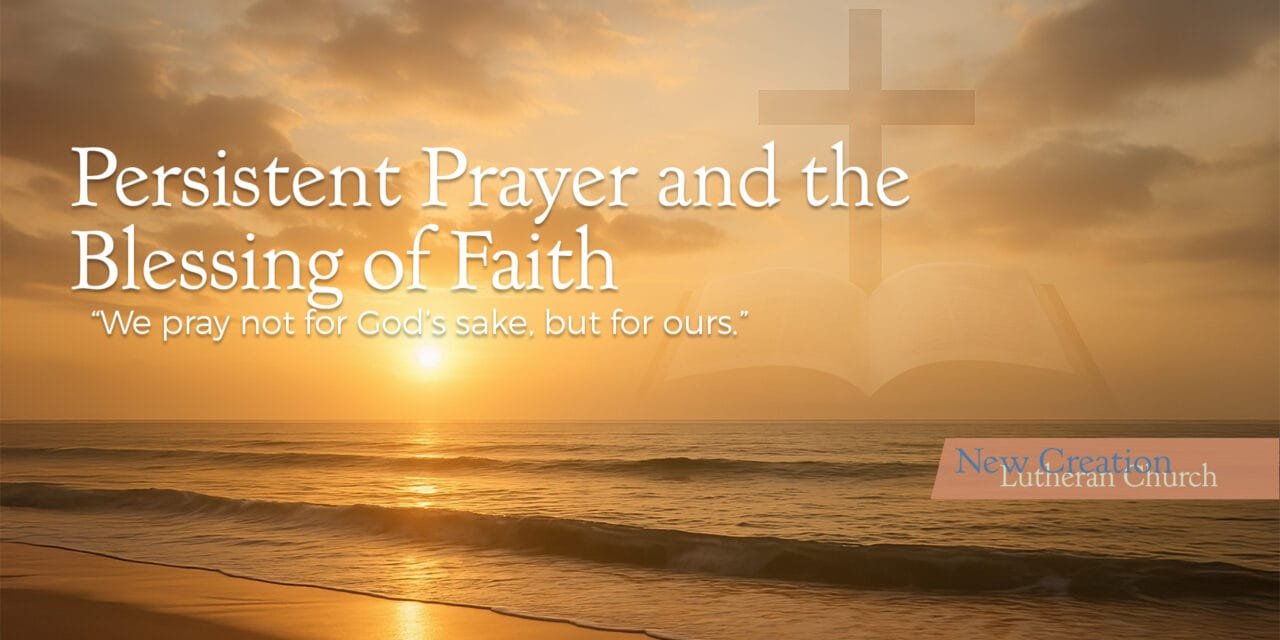
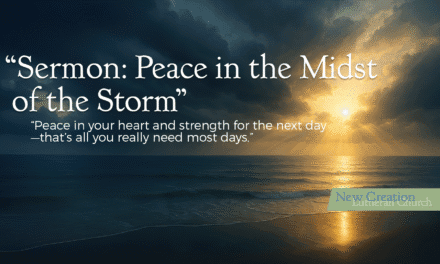
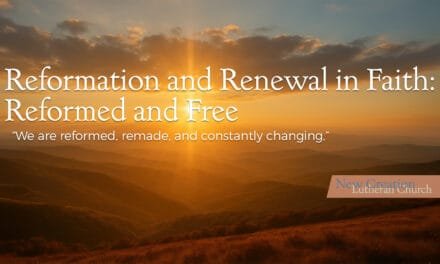
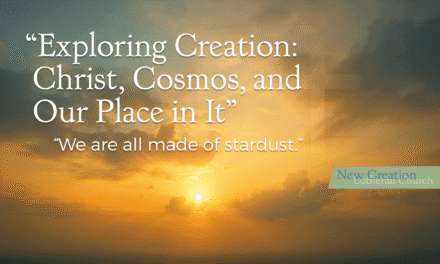
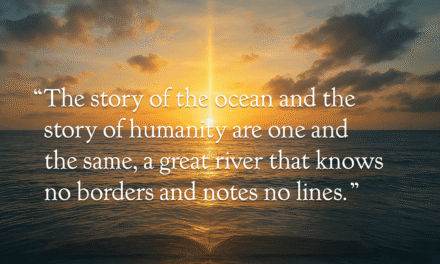



 Our Latest Updates on
Our Latest Updates on
